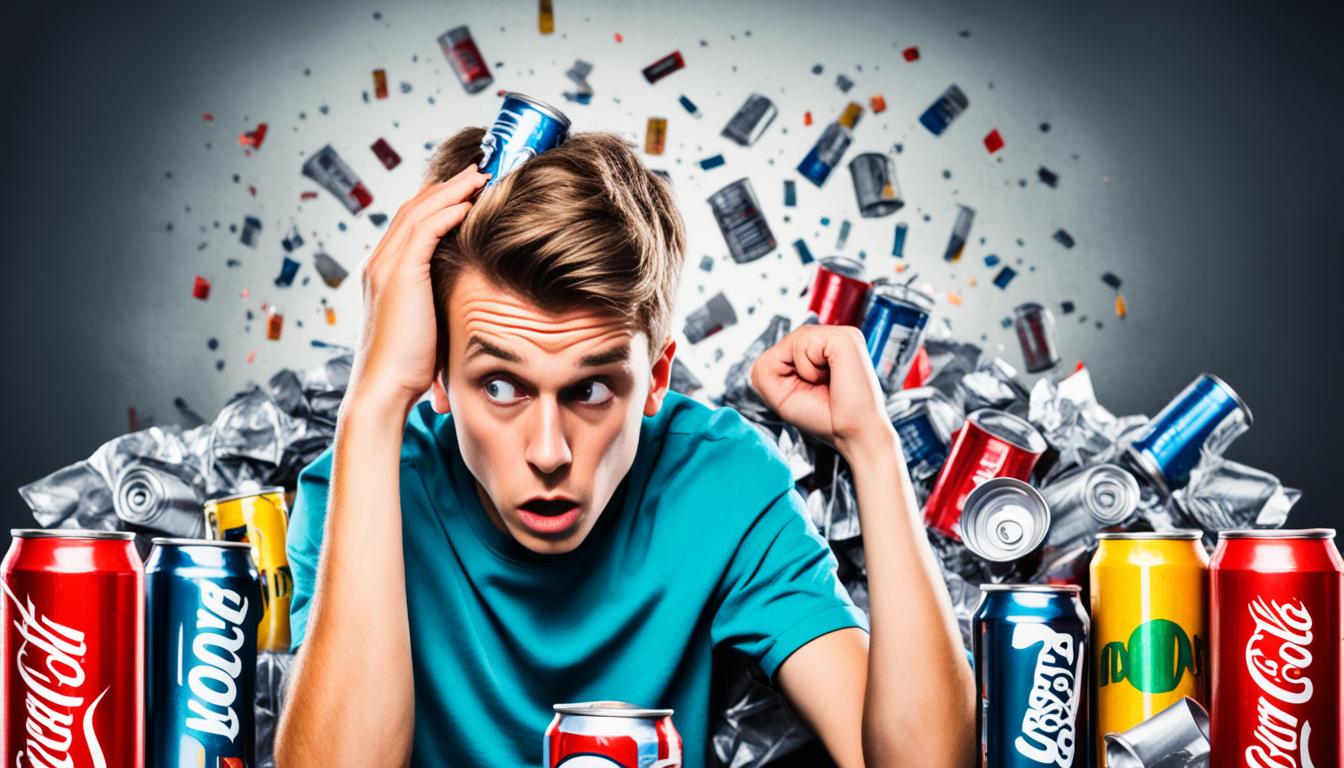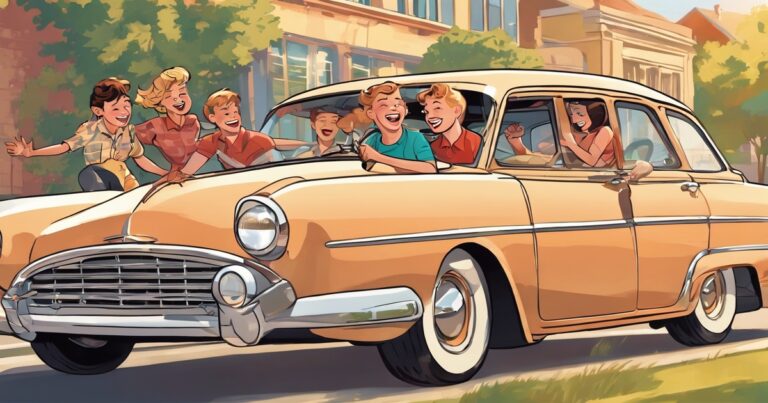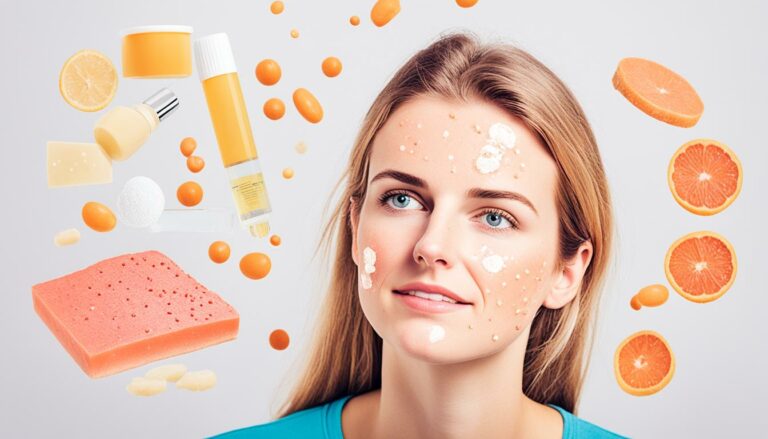Are Energy Drinks Bad for Teens? Health Facts
Energy drinks have become increasingly popular among adolescents, with studies showing that anywhere from 30% to 70% of teenagers regularly consume these beverages. The colorful packaging, candy-like flavorings, and targeted marketing have contributed to this trend. However, health experts warn that energy drinks can pose serious health risks for teens.
They contain high levels of caffeine and added sugars, which can lead to adverse effects such as increased heart rate, high blood pressure, jitters, and insomnia. Regular consumption of energy drinks can also result in dependence and withdrawal symptoms. It is important for parents to be aware of the potential harm of energy drinks and take steps to ensure their child’s safety.
Key Takeaways:
- Energy drinks can have harmful effects on teenagers due to their high caffeine and sugar content.
- Regular consumption of energy drinks can lead to increased heart rate, high blood pressure, jitters, and insomnia.
- Teens who consume energy drinks may develop dependence and experience withdrawal symptoms.
- Parents should be aware of the potential risks and take steps to ensure their child’s safety.
- Encouraging healthier alternatives and educating teens about the risks can help reduce the negative impact of energy drinks.
The Risks of Consuming Energy Drinks
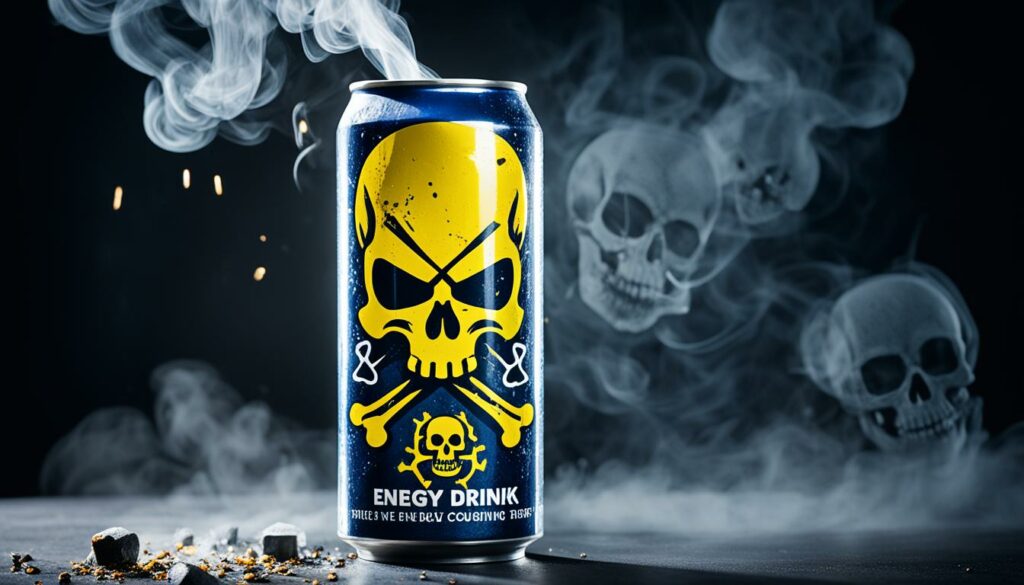
Research has shown that the excessive consumption of energy drinks can have negative consequences on adolescent health. These beverages have been associated with cardiovascular events such as arterial hypertension, cardiac arrhythmia, and even spontaneous coronary artery dissection. The high caffeine content in energy drinks can lead to increased blood pressure, arterial stiffness, and supraventricular extrasystoles. In addition to cardiovascular risks, the chronic consumption of caffeinated energy drinks has been linked to neuropsychiatric effects such as panic attacks, psychotic episodes, hyperexcitability, and headaches. It is important for parents and teens to be aware of these risks and make informed choices about their beverage consumption.
To highlight the potential harm of energy drinks on teenagers, let’s take a closer look at some of the specific risks and negative consequences associated with their consumption:
- Cardiovascular Risks: Energy drinks can significantly impact heart health in teens. The high caffeine content can cause a rapid increase in heart rate and blood pressure, increasing the risk of cardiac problems such as arterial hypertension and cardiac arrhythmia.
- Arterial Stiffness: The concentrated levels of caffeine in energy drinks can lead to increased arterial stiffness, affecting the elasticity and overall health of blood vessels.
- Supraventricular Extrasystoles: Regular consumption of energy drinks has been linked to supraventricular extrasystoles, which are abnormal heart rhythms that originate in the atria.
- Neuropsychiatric Effects: The stimulating effects of caffeine in energy drinks can trigger neuropsychiatric effects in teenagers, including panic attacks, psychotic episodes, hyperexcitability, and headaches.
These risks underscore the need for parents and teens to prioritize informed choices and consider healthier alternatives to energy drinks. By understanding the potential harm and negative consequences associated with energy drink consumption, we can protect the well-being of our teenagers and promote a healthier lifestyle.
The Role of Caffeine in Energy Drinks
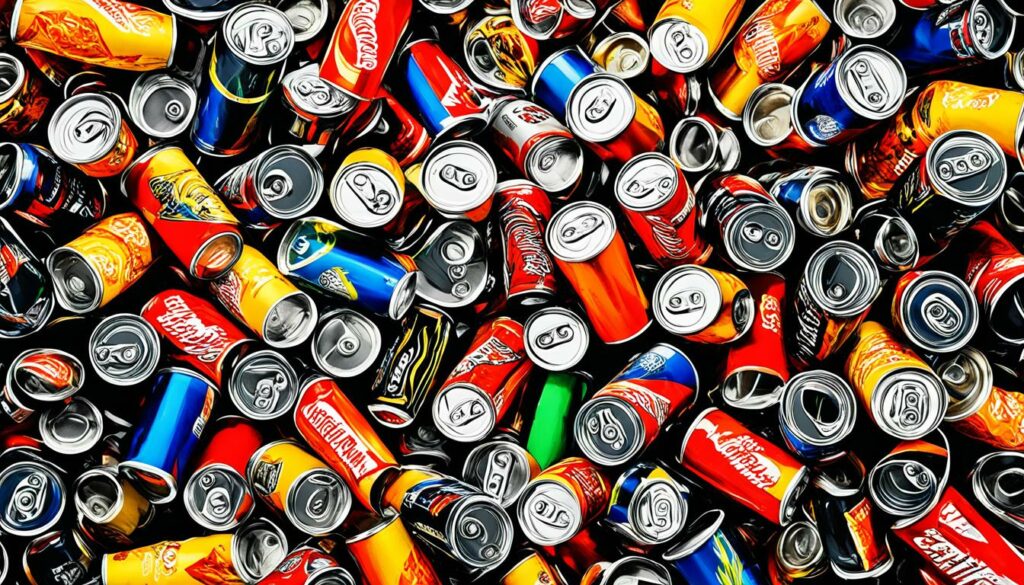
Caffeine is a key ingredient in energy drinks and is known for its stimulating effects. These beverages often contain high levels of caffeine, ranging from 100-200 mg per serving, which can significantly exceed the recommended daily caffeine intake for adolescents of less than 100 mg.
When consumed in moderation, caffeine can provide a temporary boost of energy and increased alertness. However, excessive caffeine intake, particularly from energy drinks, can have negative effects on teens’ health.
The high caffeine content in energy drinks can lead to several potential risks for adolescents. Firstly, it can cause an increased heart rate and elevated blood pressure, which may pose cardiovascular risks. Secondly, excessive caffeine intake can result in jitters and difficulty sleeping, leading to insomnia and disrupted sleep patterns.
Regular consumption of energy drinks can also contribute to the development of caffeine dependence in teens. This dependence can make it challenging for them to reduce or stop their caffeine intake, further exacerbating the potential risks associated with energy drinks and caffeine consumption.
Parents play a crucial role in monitoring their child’s caffeine intake and guiding them towards healthier alternatives. Encouraging teens to consume beverages with lower caffeine levels and promoting a balanced diet and proper sleep hygiene can help mitigate the risks associated with high caffeine intake.
“Excessive caffeine intake, particularly from energy drinks, can have negative effects on teens’ health.”
The Effects of Caffeine on Teens
The effects of caffeine on teens’ health and well-being extend beyond increased alertness and temporary energy boosts. Research has shown that high caffeine intake in adolescents can lead to a range of adverse effects, including:
- Increased heart rate and elevated blood pressure
- Jitters, restlessness, and nervousness
- Insomnia and disrupted sleep patterns
- Dehydration and increased urinary output
- Impaired calcium absorption, which may impact bone health
These effects can significantly impact teens’ overall health, academic performance, and daily functioning. It is crucial for parents and educators to educate teens about the potential risks of consuming high levels of caffeine and guide them towards healthier choices.
Ingredients to Watch Out For
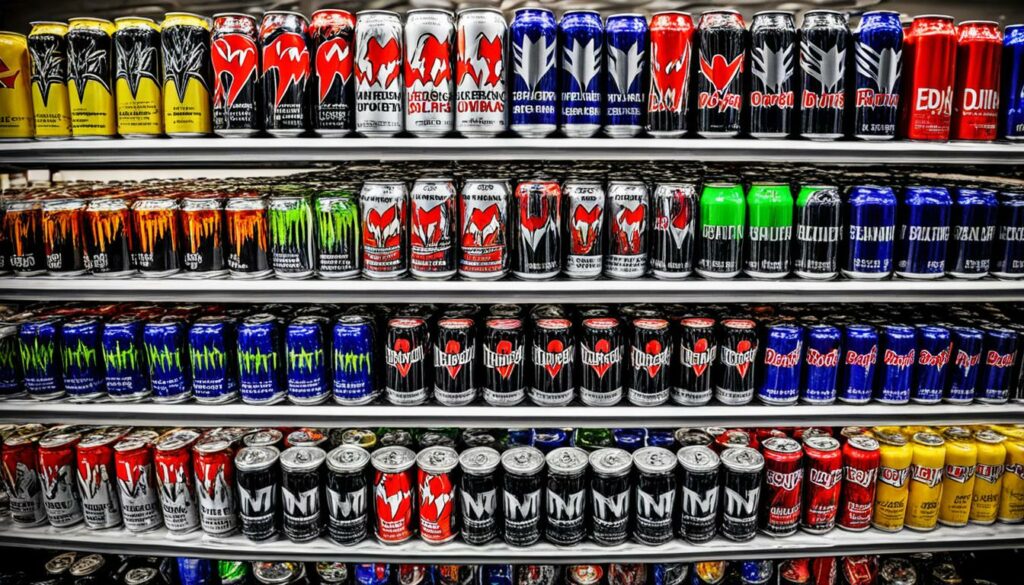
In addition to caffeine, energy drinks often contain other additives that can have negative health effects. It’s important for parents and teens to be aware of these harmful ingredients and make informed choices about their beverage consumption.
Taurine
Taurine is an essential amino acid naturally produced by adolescents and adults. It is not necessary to consume larger quantities of taurine through energy drinks. Excessive consumption of taurine has been linked to adverse effects on liver health. It is crucial to read the labels of energy drinks and limit the intake of taurine to avoid potential harm to the liver.
Added Sugars
Energy drinks often contain high amounts of added sugars, which provide a short-term boost of energy but have no nutritional value. Consuming these added sugars can cause fluctuations in blood sugar levels and contribute to weight gain. It is important to be mindful of the amount of added sugars in energy drinks and choose healthier alternatives that do not contain excessive amounts of sugar.
Dangers of Artificial Sweeteners
Some energy drinks use artificial sweeteners like aspartame and sucralose as sugar substitutes. These sweeteners may have fewer calories than sugar, but their long-term health effects are still being studied. It is recommended to avoid artificial sweeteners in energy drinks and opt for beverages without these additives to reduce the potential risks.
“Excessive consumption of taurine through energy drinks has been linked to adverse effects on liver health.”
By being aware of the harmful ingredients in energy drinks, parents and teens can make informed choices to protect their health. Reading labels, understanding the risks of taurine, added sugars, and artificial sweeteners, and opting for healthier alternatives are crucial steps in promoting a safer and healthier beverage consumption.
Safe Caffeine Usage and Alternatives
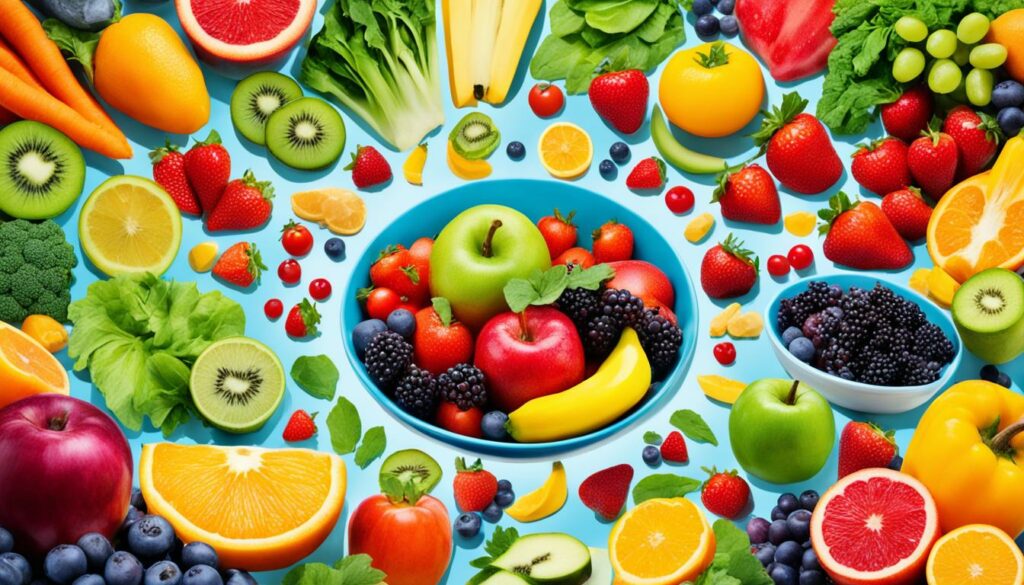
If caffeine consumption is necessary, it is recommended to opt for natural sources of caffeine such as plain tea and coffee without added sugars. These beverages are free from the additives found in energy drinks and can be consumed in moderation.
Tea is a great alternative to energy drinks, providing a milder caffeine boost. Green tea, for example, contains about 25 mg of caffeine per 8-ounce cup. It also offers additional health benefits due to its antioxidant properties.
Coffee is another natural source of caffeine, with an average of 95 mg per 8-ounce cup. For teenagers who enjoy the flavor and aroma of coffee, a small cup can provide a gentle energy boost without the excessive caffeine content found in energy drinks.
It is important for parents to educate their teens about the risks of excessive caffeine intake and encourage them to seek healthier alternatives. By promoting natural sources of caffeine like tea and coffee, parents can help their teens make better choices for their health.
Alongside caffeine alternatives, addressing tiredness and difficulty concentrating through other means is crucial. Encouraging proper sleep hygiene, ensuring teens get enough protein in their diet to support energy levels, and encouraging regular exercise are all ways to boost energy naturally without relying on caffeine.
Breaking the Cycle of Caffeine Dependence
Many teens may already be dependent on caffeine due to their regular consumption of energy drinks. Breaking the cycle of caffeine dependence can be a challenge, but it is essential for the long-term health and well-being of adolescents. Parents can play a crucial role in guiding and supporting their teens through this process.
One effective approach is to start by having an honest conversation with your teen about the underlying issues they are attempting to address with caffeine. For example, they may rely on energy drinks to combat fatigue or difficulty concentrating. Empathize with their concerns and help them explore healthier alternatives for managing these issues.
Gradually reducing caffeine intake is a critical step in breaking the cycle of dependence. Encourage your teen to start by cutting back on energy drinks and replacing them with healthier habits. This could include getting enough sleep, maintaining a balanced diet, and engaging in regular physical activity to improve energy levels naturally.
It’s important to approach this conversation with understanding and support. Focus on the long-term benefits of a healthier lifestyle rather than simply restricting or eliminating caffeine. Help your teen set small, achievable goals, and celebrate their progress along the way.
Addressing withdrawal symptoms is another aspect of reducing caffeine intake. Teens may experience symptoms such as headaches, irritability, and tiredness when they initially cut back on caffeine. Let them know that these symptoms are temporary and will subside over time. Encourage them to stay hydrated, manage stress levels, and engage in activities that promote overall well-being.
Breaking the cycle of caffeine dependence requires patience and perseverance from both parents and teens. By providing support, understanding, and guidance, parents can help their teens develop healthier habits and reduce their reliance on caffeine. It’s an opportunity to empower them to take control of their well-being and make informed choices for a healthier future.
Educating Teens about the Risks
Parents play a crucial role in educating their teens about the risks of energy drink consumption. It is important to have open and honest conversations about the potential harm and long-term health effects of these beverages. By empowering teens with knowledge and promoting health awareness, parents can help their teens make healthier beverage choices and reduce the risks associated with energy drink consumption.
Guiding Teens to Make Informed Choices
Empowering teens to make informed choices starts with educating them about the risks of energy drinks. Parents can encourage their teens to research and learn about the ingredients in energy drinks, read labels, and understand the potential health consequences. By providing teens with the necessary information, they can become more aware of the risks and make conscious decisions about their beverage consumption.
“It’s essential for parents to have open and non-judgmental conversations with their teens about energy drinks. By educating teens about the potential health risks and empowering them to make informed choices, we can support their overall well-being.”
– Dr. Sarah Thompson, Adolescent Health Specialist
Promoting Health Awareness
Teenagers often underestimate the health risks associated with energy drink consumption. By promoting health awareness, parents can help teens understand the long-term consequences and prioritize their well-being. Encourage discussions about the importance of a balanced diet, regular exercise, and sufficient sleep as healthier alternatives to boost energy levels.
The Role of Peer Influence
Peer influence plays a significant role in teenagers’ decisions, including their beverage choices. Parents can discuss the risks of energy drinks with their teens and encourage them to share this information with their friends. By spreading awareness within their peer groups, teens can collectively make healthier choices and support each other in prioritizing their health.
Leading by Example
As parents, it’s crucial to lead by example and demonstrate healthy habits. By choosing beverages that promote well-being and avoiding energy drinks ourselves, we can positively influence our teens’ choices. It’s important to reinforce that making informed choices about what we consume is an essential aspect of maintaining our overall health.
Encouraging Alternative Options
Parents can introduce their teens to healthier alternatives to energy drinks. Encourage them to explore natural sources of energy like fruits, water, and herbal teas, which provide the necessary hydration and nutrients without the harmful additives. By promoting these alternatives, teens can make better informed choices for their overall health.
| Benefits of Educating Teens about Energy Drink Risks | Effects of Promoting Health Awareness in Adolescents | Benefits of Empowering Teens to Make Informed Choices |
|---|---|---|
| Fosters awareness of potential health risks | Enables teens to prioritize their well-being | Promotes self-confidence and autonomy |
| Helps teens make informed decisions | Encourages healthier lifestyle choices | Reduces the risk of excessive caffeine intake |
| Supports informed conversations with peers | Strengthens overall health and wellness | Empowers teens to advocate for their health |
| Creates a safe and informed teen community | Establishes a foundation for lifelong health | Improves overall well-being and quality of life |
The Need for Further Regulations and Research
The consumption of energy drinks by teenagers highlights the need for further regulations and research in this area. While there are recommendations for safe caffeine intake, more stringent regulations on labeling and marketing of energy drinks to minors may be necessary. Additionally, further research is needed to understand the long-term health effects of energy drink consumption on adolescents and to identify specific risk factors.
By advocating for stricter regulations and supporting research efforts, parents and health professionals can contribute to creating a safer environment for teenagers.
Conclusion
In conclusion, the consumption of energy drinks by teenagers poses significant health risks. These beverages, with their high levels of caffeine and added sugars, can have adverse effects on cardiovascular health and mental well-being. It is crucial for parents to be knowledgeable about the potential harm and to educate their teens about the risks associated with energy drink consumption.
Encouraging healthier alternatives and helping teenagers understand the importance of making informed choices about their beverage consumption is paramount. By promoting health awareness and advocating for stricter regulations, we can take steps towards protecting the well-being of our teens.
It is vital for parents to prioritize their child’s health by actively discussing the hazards of energy drinks, promoting healthier options, and empowering their teens to make informed choices. By doing so, we can work together to ensure a healthier future for our teenagers.
FAQ
Are energy drinks bad for teenagers?
Yes, energy drinks can be bad for teenagers. They contain high levels of caffeine and added sugars that can have negative effects on their health.
What are the risks of consuming energy drinks?
Consuming energy drinks can lead to adverse cardiovascular effects such as increased heart rate and high blood pressure. It can also have neuropsychiatric effects and cause dependence and withdrawal symptoms.
What is the role of caffeine in energy drinks?
Caffeine is a main ingredient in energy drinks and can lead to increased alertness and temporary energy boost. However, excessive caffeine intake can have negative effects such as increased heart rate, elevated blood pressure, and jitters.
Are there any harmful ingredients in energy drinks?
Yes, energy drinks can contain ingredients like taurine, added sugars, and artificial sweeteners. These can have negative effects on liver health, cause fluctuations in blood sugar levels, and have unknown long-term health effects respectively.
Are there any alternatives to energy drinks?
Yes, teens can opt for natural sources of caffeine such as plain tea and coffee without added sugars. It is important to consume them in moderation and choose healthier alternatives.
How can teens break the cycle of caffeine dependence?
Breaking the cycle of caffeine dependence can be challenging but not dangerous. Teens can gradually reduce caffeine intake and replace it with healthier habits like getting enough sleep, eating a balanced diet, and engaging in regular physical activity.
How can we educate teens about the risks of energy drinks?
Parents play a crucial role in educating their teens about the risks of energy drink consumption. They can have open conversations, encourage research and learning, and promote health awareness to help teens make informed choices.
Is further research and regulation needed on energy drinks?
Yes, further research and regulation are needed to understand the long-term health effects of energy drink consumption and to protect teenagers from potential harm. Stricter regulations on labeling and marketing to minors may be necessary.
What is the conclusion on energy drink risks for teens?
In conclusion, energy drinks can pose serious health risks for teenagers. It is important for parents to be aware of these risks, educate their teens, and promote healthier choices to protect their well-being.

